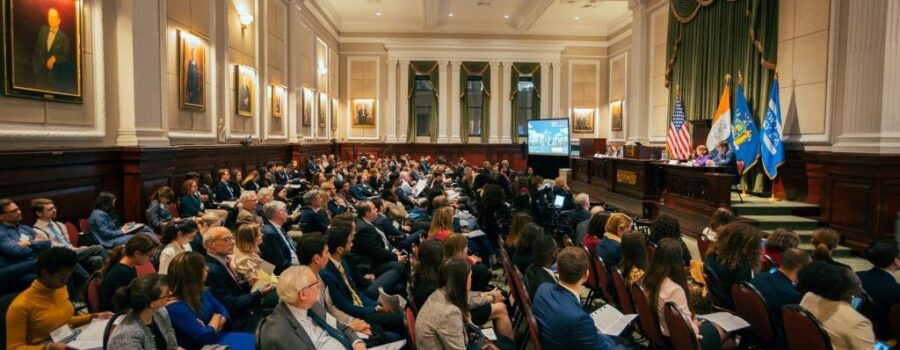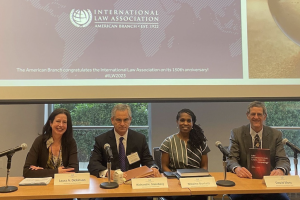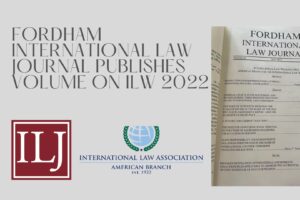Recap of ILW 2021
International Law Weekend 2021 took place from October 28-30, 2021. The unifying theme was Reinvesting in International Law, as follows:
Hindered by a retreat from multilateralism, the international legal community is struggling to respond to the global challenges of our day: climate change, economic inequality, impunity for atrocity crimes, and now the pandemic. We are at a key inflection point in crafting our response to these challenges. We must ask ourselves, “where is the international legal order meeting expectations and where is it falling short?” Where should we reinforce the current system and where must we develop new solutions? How can we revitalize our global health, economic, and human rights institutions to make them more durable and impactful? Where do we require more robust legal frameworks and where, perhaps, do we need less regulation? How should we tailor our reinvestment in international law?
This exciting annual conference is a signature event of the Branch. Given the continuing effect of the COVID-19 pandemic, this year’s conference was hosted virtually by Arbitration Place during International Law Week at the United Nations.
Roughly 1,500 people registered for the event. Attendees included leading academics, ambassadors and other diplomats, federal and state government officials, NGO leaders, practitioners and partners at some of the world’s largest law firms, students, journalists, business leaders, and interested citizens. The conference participants hailed from more than 80 countries.
This year’s program included 32 panels, 186 speakers, two distinguished keynote speakers, and a High-Level Plenary Panel. The Weekend offered a broad array of both public international law and private international law topics, such as The Meaning of Silence, The Role of the ICJ in State Intervention by Non-Parties to a Dispute, Leveraging the UN for Greater Rule of Law Protections in MENA and Beyond, The Meaning of Diversity, Equity, and Inclusion in International Law, and Debating a WTO TRIPS Waiver for COVID.
Nineteen panels on a variety of private and public international law topics—including The Geopolitics of Economic Competition, Prosecuting the Crime of Ecocide, Small Satellites, Big Possibilities: How to Build a Fair Legal Regime for a Developing Technology, and Environmental Degradation and Indigenous Rights—were designated for continuing legal education (CLE) credit, made possible through the sponsorship and assistance of White & Case LLP.

ILW 2021 opened Thursday afternoon with the President’s Opening Plenary Panel on Reinvesting in International Law. ABILA President Leila Nadya Sadat moderated a discussion between Pablo Arrocha Olabuenaga (Permanent Legal Adviser, Permanent Mission of Mexico to the United Nations), Nicola Bonucci (Partner, Litigation Department, Paul Hastings LLP; former Director for Legal Affairs, Organization for Economic Cooperation and Development (OECD)), Ambassador Nazhat Shameem Khan (President, UN Human Rights Council), and Dire Tladi (Member, International Law Commission; Professor of International Law and SARChI Chair of International Constitutional Law, University of Pretoria; President, International Law Association (South Africa)).
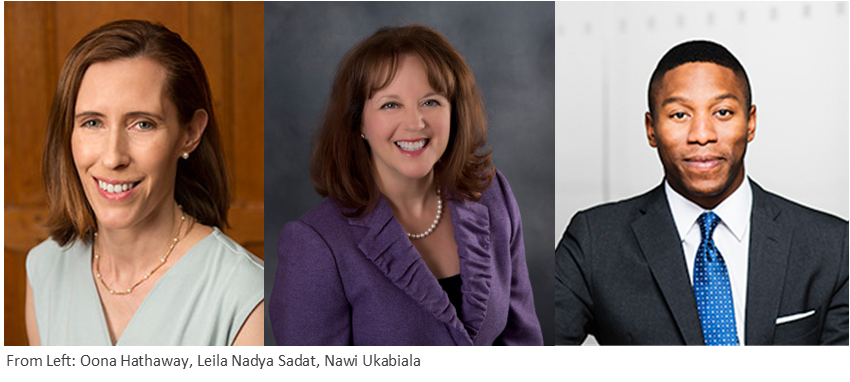
On Friday afternoon, Oona Hathaway, the Gerard C. and Bernice Latrobe Smith Professor of International Law and Counselor to the Dean at Yale Law School, delivered a keynote address on “War Beyond Law: A Threat to the International Legal Order.” Reviewing the development and enforcement of international humanitarian law, Professor Hathaway set forth the argument that the prohibition against the unilateral use of force is a foundational principle of the modern legal order and not merely an auxiliary provision. Her remarks explored modern challenges, including cyberattacks, partnered operations, and the growing lack of legal clarity around the parameters of self-defense. Leila Sadat and Nawi Ukabiala moderated a lively Q&A following Professor Hathaway’s formal remarks.
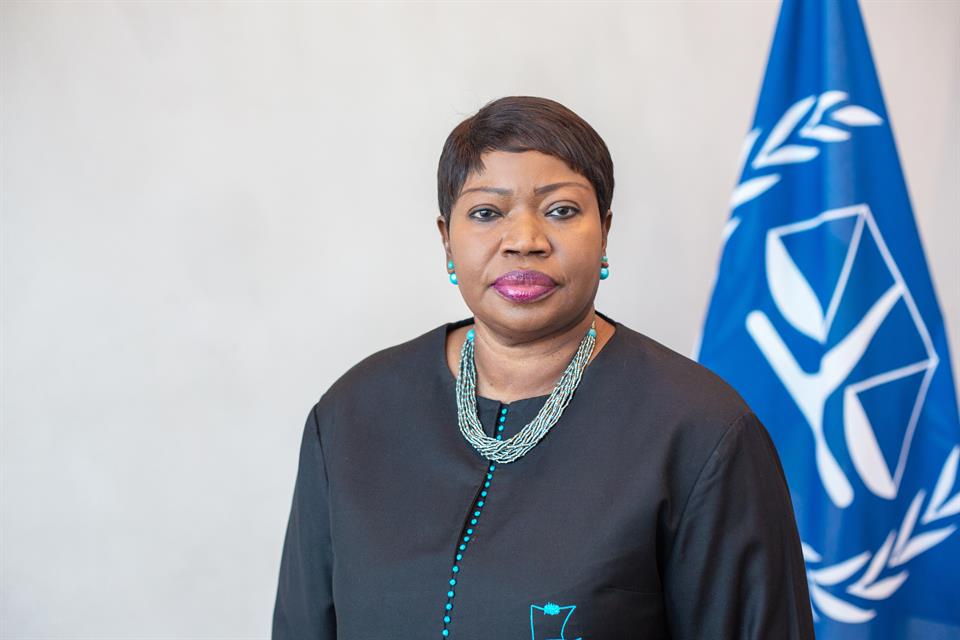
Fatou Bensouda
Fatou Bensouda, former Chief Prosecutor at the International Criminal Court, opened the Saturday morning program with the Inaugural ABILA Outstanding Achievement Award keynote address. She remarked that: “nine years ago I stated that justice, real justice, is not a pick and choose system and that to be effective, to be just, and to be a real deterrent the Office of the Prosecutor’s actions and decisions must be based solely on the law and on the evidence. We may operate in a political environment, but our work must be shielded and free from the whims of politics when those trends are not aligned with our collective obligations under the Rome Statute. During my tenure, I have done my utmost to lead by these convictions in service of the Rome Statute. […] Even in the face of adversity, even at considerable personal cost, I have sought to focus not on the words and propaganda of a few influential individuals whose aim is to derail justice, but rather to listen to the victims who look to the court as a beacon of hope, as a last bastion of justice and accountability for atrocity crimes, where the law, their protector, has otherwise fallen silent.”
Her inspiring talk was followed by the 99th Annual ABILA Members Meeting. ILW 2021 also hosted networking rooms by 15 ABILA committees, and three community networking rooms for Women and International Law, Minorities and International Law, and Young Lawyers. The virtual platform allowed individuals to meet and converse with other participants from around the world. Brill Nijhoff also hosted a drop-in room for attendees, with a virtual exhibition room of its many international law titles for registrants to peruse.
On Saturday, ABILA Vice-President Amity Boye organized a splendid Career Networking Session for students and young professionals, who attended ILW in large numbers this year from law schools around the globe. The event was organized in cooperation with the ABA International Law Section, the International Law Students Association, Wade Channell, Norman Greene, and David Kassebaum.
The Weekend also featured the Second Annual International Law Trivia Night, hosted by ABILA President-Elect Michael P. Scharf (Dean, Case Western Reserve University School of Law) and ABILA Membership Officer Madaline George. Participants were challenged by a tough set of questions, including the name of the first woman to receive the Nobel Peace Prize and the name of her famous book (Austrian Baroness Bertha von Suttner, “Die Waffen Neider!” (Lay Down Your Arms!, 1889)); and the first cases before the ICC, ICTY, ICRY, and ECCC, the name of the vessel that was sunk in 1985, leading to an important case on State responsibility (the Rainbow Warrior); the African-American diplomat who served on the U.S. delegation for both the Dumbarton Oaks Conference and the UN Conference in San Francisco (Ralph Bunche), and how many prosecutions there have been under the U.S. War Crimes Act (zero). The winners of the Second Annual Trivia Night were: Kevin Gray, Barry Hashimoto, Marcelo Meza, Michael J. Moffatt, Douglas Pivnichny, and Benjamin Salas. A truly international team, the players hailed from Austria, Canada, Chile, and the United States.
Recordings of all ILW 2021 panels, keynotes, and plenary sessions are available online to members in good standing.
Thank you to the Sponsors of ILW 2021
♦ Diamond Level: Arbitration Place, Debevoise & Plimpton LLP, and White & Case LLP
♦ Platinum Level: Winston & Strawn LLP
♦ Gold Level: ASU Sandra Day O’Connor College of Law; Benjamin N. Cardozo School of Law; Columbia Law School; Covington & Burling LLP, Georgetown Law Center; George Washington University Law; The University of Georgia School of Law; NYU Law; Santa Clara University School of Law; and Vanderbilt Law School’s International Legal Studies Program
♦ Silver Level: American Bar Association—International Law Section; American Society of International Law; Brill | Nijhoff; California Western School of Law; Case Western Reserve University School of Law; Cornell Law School; Dechert LLP; FDM OGEMID; International Law Students Association; the University of Pennsylvania Law School; Seton Hall University School of Diplomacy and International Relations; and Washington University School of Law.
ILW 2021 Organizing Committee
ILW 2021 was made possible by the Organizing Committee and Student Ambassadors as well as the effort of Madaline George (ABILA Membership Officer & ILW Administrative Coordinator) and Rukhsar Azamee (ABILA Media Officer). The 2021 ILW Co-Chairs were Julian Arato, Professor of Law and Co-Director of the Dennis J. Block Center for the Study of International Business Law at Brooklyn Law School; Amity Boye, Director of Executive Projects at White & Case LLP; and Nawi Ukabiala, Associate at Debevoise & Plimpton LLP.
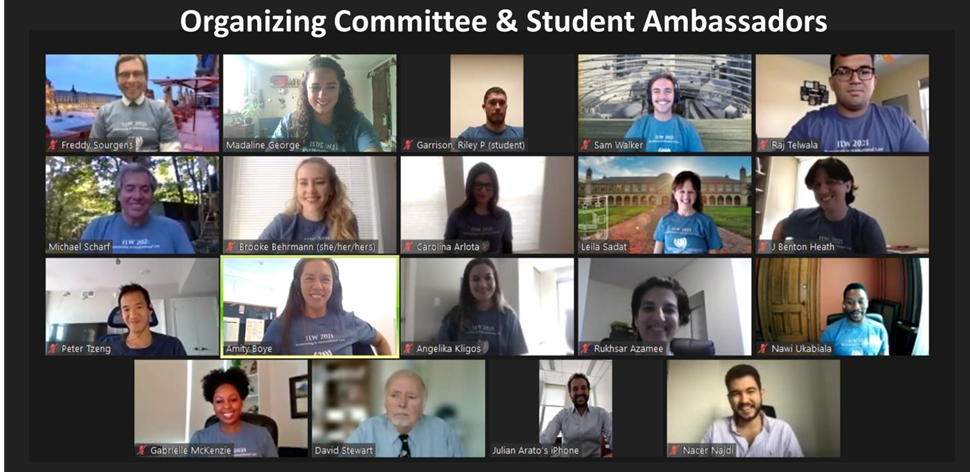
Other members of the ILW 2021 Organizing Committee included Carolina Arlota, Visiting Assistant Professor, The University of Oklahoma College of Law; Pamela Bookman, Associate Professor of Law, Fordham Law School; Kathleen Claussen, Associate Professor of Law, University of Miami School of Law; J. Benton Heath, Assistant Professor of Law, Temple University Beasley School of Law; Gabrielle McKenzie, Law Clerk, Debevoise & Plimpton LLP; Milena Sterio, Charles R. Emrick Jr.-Calfee Halter & Griswold Professor of Law, Cleveland-Marshall College of Law; Frédéric Sourgens, Senator Robert J. Dole Distinguished Professor of Law and Director of the Washburn Oil and Gas Law Center, Washburn University School of Law; Peter Tzeng, Associate, Foley Hoag LLP; and Isavella Vasliogeorgi, Legal Officer, Department of Management Strategy, Police and Compliance, United Nations. Branch President Leila Nadya Sadat, President-Elect Michael Scharf, Board Chair David Stewart, and Membership Officer Madaline George participated ex officio.
Our 2021 Student Ambassadors were Brooke Behrmann, Case Western Reserve University School of Law; Hannah Fulwiler, Willamette University College of Law; Riley Garrison, Pepperdine Caruso School of Law; Angelika Kligos, Georgetown University Law Center; Rory Hayes, Santa Clara University School of Law; Nacer Najdi, George Washington University Law School; Raj Telwala, Touro College Jacob D. Fuchsberg Law Center; and Sam Walker, UIC John Marshall Law School.

